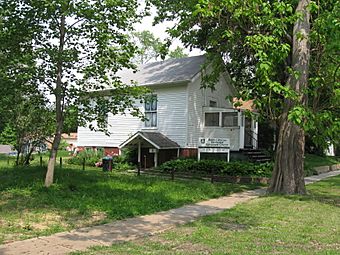Bethel AME Church (Iowa City, Iowa) facts for kids
The Bethel African Methodist Episcopal Church is a very old and important church building in Iowa City, Iowa. It is a special place for the African American community. This church has a long history, starting way back in 1868.
About Bethel AME Church
The Bethel African Methodist Episcopal Church is more than just a building. It is a community of people. The church was started in 1868. Many of its first members were free people of color. These were African Americans who were not enslaved. They came from both the southern and northern parts of the United States.
A Rich History
A church member named James W. Howard helped the church get its land. He bought some property in Iowa City. Then, he sold part of it to the church for only $50. This was a very kind and helpful act. The church building was then built on this land in the same year, 1868. It was a simple white wooden church.
Iowa City has always had a small African American community. Over the many years, the church community changed in size. Sometimes more people joined, and sometimes fewer. The church also faced challenges with money. But it always remained an important place for its members.
Growing Over Time
The first church building was quite small. It was about 600 square feet (56 square meters). It could hold about 50 people. As the years went by, the church community grew. It eventually became too big for the small original building.
So, in 2010, a new, much larger part was added to the church. This new section is about 4,000 square feet (372 square meters). It can hold three times as many people as the original church. This shows how much the church community has grown and thrived.
A Special Historic Place
Because of its long history and importance, the original Bethel AME Church building is recognized as a special place. It was added to the National Register of Historic Places in the year 2000. This means it is protected and celebrated for its historical value. It helps us remember the history and contributions of African Americans in Iowa City.




